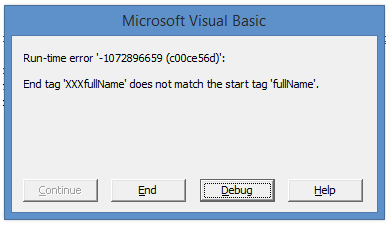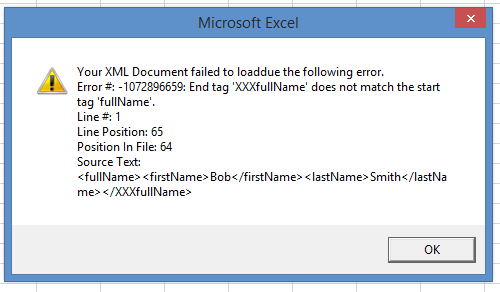Reading XML into Excel
One interesting use for Excel is using it as a platform for calling web services. While the Web Browser is the obvious platform for sending and receiving web based data, sometimes Excel is a better application to analyse formatted lists or numerical data. Excel gives you the ability to import and query data via web services.
Excel VBA - Loading XML string defined in program into VBA XML DOM Document
In this example we define an XML string, load the string and use it to populate a DOM document.
Sub XMLTest01()
'In Tools > References, add reference to "Microsoft XML, vX.X" before running.
'create instance of the DOMDocument object:
Dim xmlDoc As MSXML2.DOMDocument
Set xmlDoc = New MSXML2.DOMDocument
Dim strXML As String
'create XML string
strXML = "<fullName>" & _
"<firstName>Bob</firstName>" & _
"<lastName>Smith</lastName>" & _
"</XXXfullName>"
' use XML string to create a DOM, on error show error message
If Not xmlDoc.LoadXML(strXML) Then
Err.Raise xmlDoc.parseError.ErrorCode, , xmlDoc.parseError.reason
End If
End Sub
XML error message: Note that there is an error in the terminating the XML fullname tag

Some VBA vocabulary
MSXML2.DOMDocument The DOMDocument object represents the top node in the tree. It implements all of the base Document Object Model (DOM) document methods and provides additional members that support Extensible Stylesheet Language (XSL) and XML transformations. Only one object can be created: the document. All other objects are accessed or created from the document.
LoadXML Loads an XML document using the supplied string.
Loading XML in Excel VBA - Enhanced error reporting
Sub XMLTest02()
'In Tools > References, add reference to "Microsoft XML, vX.X" before running.
'create instance of the DOMDocument class:
Dim xmlDoc As MSXML2.DOMDocument
Set xmlDoc = New MSXML2.DOMDocument
Dim strErrText As String
Dim xmlError As MSXML2.IXMLDOMParseError
Dim strXML As String
'create XML string
strXML = "<fullName>" & _
"<firstName>Bob</firstName>" & _
"<lastName>Smith</lastName>" & _
"</XXXfullName>"
' use XML string to create a DOM, on error show error message
If Not xmlDoc.LoadXML(strXML) Then
' get the ParseError object
Set xmlError = xmlDoc.parseError
With xmlError
strErrText = "Your XML Document failed to load" & _
"due the following error." & vbCrLf & _
"Error #: " & .ErrorCode & ": " & xmlError.reason & _
"Line #: " & .Line & vbCrLf & _
"Line Position: " & .linepos & vbCrLf & _
"Position In File: " & .filepos & vbCrLf & _
"Source Text: " & .srcText & vbCrLf
End With
' Display error & exit program
MsgBox strErrText, vbExclamation
Set xmlDoc = Nothing
End
End If
End Sub
XML error message: Note that there is an error in the terminating the XML fullname tag

Reading an XML file into Excel
'In Tools > References, add reference to "Microsoft XML, vX.X" before running.
Sub subReadXMLStream()
Dim xmlDoc As MSXML2.DOMDocument
Dim xEmpDetails As MSXML2.IXMLDOMNode
Dim xParent As MSXML2.IXMLDOMNode
Dim xChild As MSXML2.IXMLDOMNode
Dim Col, Row As Integer
Set xmlDoc = New MSXML2.DOMDocument
xmlDoc.async = False
xmlDoc.validateOnParse = False
' use XML string to create a DOM, on error show error message
If Not xmlDoc.Load("http://itpscan.info/blog/excel/xml/schedule.xml") Then
Err.Raise xmlDoc.parseError.ErrorCode, , xmlDoc.parseError.reason
End If
Set xEmpDetails = xmlDoc.DocumentElement
Set xParent = xEmpDetails.FirstChild
Row = 1
Col = 1
Dim xmlNodeList As IXMLDOMNodeList
Set xmlNodeList = xmlDoc.SelectNodes("//record")
For Each xParent In xmlNodeList
For Each xChild In xParent.ChildNodes
Worksheets("Sheet1").Cells(Row, Col).Value = xChild.Text
Debug.Print Row & " - "; Col & " - " & xChild.Text
Col = Col + 1
Next xChild
Row = Row + 1
Col = 1
Next xParent
End Sub
Some VBA vocabulary
MSXML2.IXMLDOMNode The IXMLDOMNode object provides methods that represent the core functionality of any node.
async XML DOM property that specifies whether asynchronous download is permitted.
validateOnParse XML DOM property that indicates whether the parser should validate this document.
FirstChild Gets the first child of the node.
output in MS Excel:

Clear cache
This code is useful if you are using Apache Basic Athorization and user changes their userid/password. Even if the code creates a brand new XMLHttpReq object and sets this header to the new information, it logs in to the server as the first user, presumably from cached credentials. This code eventively clears the cache in most browsers and lets user log in with a new username/password combination.
Sub subClearCache()
' force browser to clear cache
myURL = "http://172.16.50.250/blackberry/BBTESTB01.pgm"
Dim oHttp As New MSXML2.XMLHTTP
oHttp.Open "POST", myURL, False
oHttp.setRequestHeader "Content-Type", "application/x-www-form-urlencoded"
oHttp.setRequestHeader "Cache-Control", "no-cache"
oHttp.setRequestHeader "PragmaoHttp", "no-cache"
oHttp.setRequestHeader "If-Modified-Since", "Sat, 1 Jan 2000 00:00:00 GMT"
oHttp.setRequestHeader "Authorization", "Basic " & Base64EncodedUsernamePassword
oHttp.send "PostArg1=PostArg1Value"
Result = oHttp.responseText
End Sub